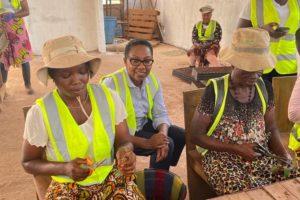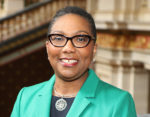15th March 2023
Rights, freedom and potential: our Women and Girls Strategy

Last week the FCDO (Foreign, Commonwealth & Development Office) launched its International Women and Girls Strategy on International Women’s Day. As the Director for Education, Gender and Equalities, and Gender Envoy at the FCDO, I had the privilege and pleasure of joining the Foreign Secretary in Sierra Leone for the launch, where we saw the power of investing in women and girls. Over the course of my career, I have seen the positive strides in gender equality. There are more girls in school, fewer girls are forced into early marriage, more women survive pregnancy and there are more women serving in leadership positions. As the Foreign Secretary said last week:
Gender equality is the fundamental building block of all healthy democracies.

But these gains are increasingly under threat. Climate change, crises and conflict continue to disproportionately affect women and girls.
There is also increasing momentum behind systematic attempts to roll back on women’s and girls’ rights internationally, nationally and at the community level. This isn’t just about rhetoric, this is about real-life impacts on women’s and girls’ lives – limiting access to sexual and reproductive health and rights, condoning violence against women and girls, for example.
And so, we need to be bolder and more ambitious. We must be willing to stand up for what we believe in. I am proud that our Strategy does just that. The FCDO is putting women and girls at the heart of everything we do.
But what does that mean in practice?
It means we will do even more to stand up and speak out for women’s and girls’ rights and freedoms on the global stage and in our bilateral relationships. We must stop those intent on reversing the hard-won gains in gender equality. We will use FCDO’s entire toolkit to build support for gender equality and secure progress on women’s and girls’ rights. Last week, on International Women’s Day, FCDO announced a new package of sanctions aimed at human rights violators, particularly those who target women and girls. As the Foreign Secretary said:
These sanctions send a clear message that the perpetrators of abhorrent gender-based violence must be held accountable.
We must harness the agency of women as they know the solutions to the problems they face. They live with the impacts of gender inequalities every day and need to be part of the solutions to these challenges – whether in response to crisis, building peaceful societies, ending harmful practices such as female genital mutilation or participating in climate negotiations. I have seen this first hand during recent visits to countries as diverse as Colombia and the Occupied Palestinian Territories. But so often their perspective is overlooked. In 2021 to 2022, as little as 1.25% of the $56.5 billion Official Development Assistance dedicated to gender equality reached women’s rights organisations.
So, FCDO will step up our support to women’s rights organisations and movements. And I am delighted that we have announced our new partnerships with the Equality Fund (an international women’s fund) and Gender Links (a South African-based women’s rights organisation), through our flagship programme.
We will support women throughout their lives and at key life stages and transitions which can have the greatest impacts on this generation and the next. Early childhood, adolescence and transitions into and out of work due to pregnancy and childcare are all points where our investments can make the most difference to whether women and girls achieve their full potential.
Crises and conflicts put women and girls at particular risk. This includes food insecurity and malnutrition, health crises, and migration and forced displacement.
We will mobilise support for women and girls impacted by crises, conflict and shocks.
Finally, we need stronger systems – political, economic and social – that play a critical role in protecting and empowering women and girls. This includes technological and financing solutions that will secure long-term development and change.
We will stay true to our commitment to leave no one behind and to tackle poverty. The challenges are greater for women facing multiple dimensions of disadvantage. We will continue to focus on educating girls, empowering women and girls and championing their health and rights and ending gender-based violence. These are the areas where the challenges are the most acute and the potential gains greatest.
We are well placed to drive efforts to help in the battle for gender equality:
- since 2015 we have helped educate more than 8 million girls
- since 2013 we have helped secure pledges from over 27 million people to abandon Female Genital Mutilation, and
- since 2018 we have helped 25 million women and girls access family planned advice

We pledge to:
Drive the conversation and deliver a major global campaign – Rights, Freedom, Potential – standing up for the rights of women and girls and amplifying their role as agents of change. To that end, I am looking forward to our Wilton Park event later this month on Women’s Economic Empowerment: Stimulating Renewed Global Momentum and Driving Long-Lasting change. This is the first in a series that will drive the conversation and action on women’s and girls’ rights.
Lead by example, putting women and girls at the centre of FCDO’s operations and investments. We have set ourselves the challenge of ensuring that at least 80% of FCDO’s bilateral aid programmes should have a focus on gender equality, using OECD Development Assistance Committee (DAC) markers, by 2030.
Lead through knowledge, we will build on our pioneering research into issues such as preventing violence against women and girls; supporting adolescent girls; strengthening women’s livelihoods; and sexual and reproductive health and rights to produce new and better evidence on what works to reach and support women and those furthest behind.
We are ambitious. And, although we face many challenges, I truly believe we can be successful in achieving our objectives. By putting women and girls at the heart of everything we do, we will advance gender equality in all corners of the world and ensure that women and girls everywhere have Rights, Freedom and Potential.
